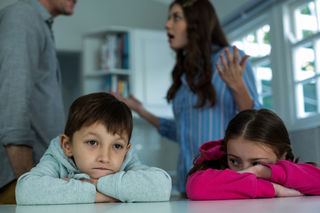Divorce
4 Reasons Why a Bad Marriage Is Worse for Children Than Divorce
When marriages turn toxic, divorce can actually help kids.
Posted March 31, 2017

Before You Consider Divorce
Ending a marriage is a brutal undertaking that should only be an option after all other efforts have been exhausted. Before you call your lawyer, here are a few suggestions:
Couples Counseling
Couples counseling works best when it teaches parents how to work through their conflicts without resorting to emotional warfare (see "Hate Me in a More Loving Way: A Couples Guide to Better Arguing"). It also gives ill-tempered parents a place to work through their differences rather than exposing their kids to them. The goal of couple’s therapy is to enrich communication and enhance intimacy. But be warned: Couples therapy can be treacherous, and the wrong therapist can spell doom for your marriage. Gather trustworthy recommendations, take your time, and interview several professionals. Make sure you both agree on the therapist you choose; otherwise, the therapy will become just another bone of contention.
Individual Therapy
Nothing stirs up unresolved childhood issues like marriage. Too often, couples have unrealistic expectations of marriage, and become disillusioned when they discover that good marriages take work. Before you blame all the problems in your marriage on your partner, get some help for yourself. A skilled therapist can help you identify problems from your past that are resurfacing in your relationship.
Support Groups
The best outcome of group work comes from sharing your feelings and discovering that you’re not alone. Hearing about other couples’ struggles, the difficulties they face, and how they work through them can bring much-needed inspiration and relief. It also provides you with a community of people who can inspire you with new choices in your marriage.
Zoe’s Story
Zoe, a shaggy-haired thirteen-year-old with sad eyes, glares at me, arms folded and jaw set; a therapy hostage if I ever saw one. Parents exert their executive power when it comes to therapy, so I don’t expect Zoe to cooperate, especially during our first tumultuous session. To kids like Zoe, therapy is an insult.
Zoe, however, offers me a deal: “I’ll be in therapy with you only if you promise one thing. I want you to convince my parents to get divorced.” I was flabbergasted by her request, but it opened my eyes to something I had never considered—the positive side of divorce
Zoe suffered ongoing humiliation in public, in school, and in front of her friends due to her parents' combative relationship. The verbal abuse she witnessed her mother suffer at the hands of her father never let up. As a result, Zoe struggled with ongoing headaches, depression, and weight problems.
After meeting with her parents and witnessing their sneering contempt for each other, I understood Zoe’s request. If I could barely stand them for 30 minutes, what must it be like to live with them?
Within a year after her parent’s divorce, Zoe's depression lifted: She went from failing school to placing on the honor role. She also had her first boyfriend and became socially outgoing. In fact, I was amazed at how much better life became for everyone.
To schedule a parenting workshop, view videos or articles, or order your copy of WHEN KIDS CALL THE SHOTS, visit seangrover.com.


